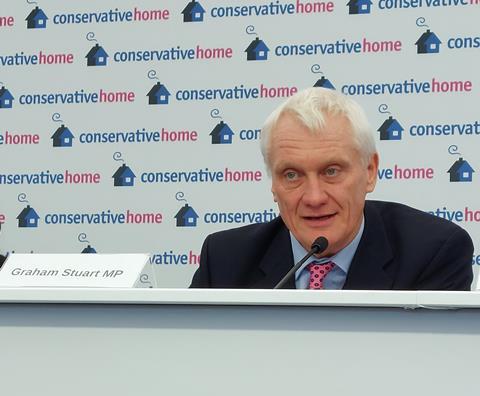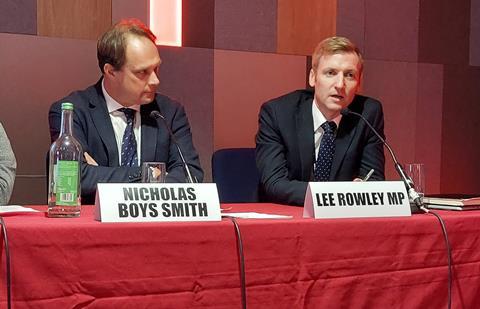Government is ignoring the experts as uncertainty reigns and the business secretary promises more unwanted regulatory changes, writes Ben Flatman
The government seems to be imploding before our eyes, but some ministers are ploughing on regardless. The business secretary Jacob Rees-Mogg has promised another clear-out of ŌĆ£EU regulationŌĆØ, the only noticeable impact of which is to create huge uncertainty for business.
Yesterday at a meeting I attended in Birmingham, he offered up some tinkering over the way in which mobile phone masts are inspected as an example of the supposedly deeply onerous regulations that he would be sweeping away.
Like KwartengŌĆÖs unwanted 45p tax cut, this is just pointless fiddling that nobody has asked for and wonŌĆÖt make the slightest difference to UK competitiveness. Such detachment from the real economic crisis bearing in on business seems to pervade the party.

>> Also read: Day two at the Tory conference: U-turns and Brexit cast shadow over growth agenda
>> Also read: Day one at the Tory conference: Industry cries out for stability ŌĆō but U-turns and uncertainty continue
Underlying it all is the fundamental change wrought on the party by Brexit. From being the party of economic orthodoxy, the Conservatives have metamorphosed into a mystical cult. At the core of their new philosophy is a belief that miracles can happen, but only if you ignore the experts.
It was during the 2016 EU referendum campaign that Michael Gove famously said: ŌĆ£The people of this country have had enough of experts.ŌĆØ Now we are seeing the results.
Everywhere you turn at the Conservative Party conference housing and construction industry leaders are asking for clarity on policy and regulation. Meanwhile the Tories seem to be in a parallel economic universe, where regulatory uncertainty is what business is crying out for.
The sheer quantity of squandered knowledge and expertise is staggering. The referendum may have been six years ago, but it ushered in a protracted period of uncertainty and missed opportunity, now hugely exacerbated by a pandemic and energy crisis.
Ronald Reagon once said that the ŌĆ£nine most terrifying words in the English language are, ŌĆśIŌĆÖm from the government, and IŌĆÖm here to helpŌĆÖ.ŌĆØ It is perhaps ironic that many in business now clearly feel the same way about this administration, run by the self-proclaimed ŌĆ£party of low taxation and small governmentŌĆØ.
The Conservatives have overseen the erection of huge barriers to trade, alongside an explosion in spending and borrowing, while tax has reached record highs. If this is the best this government can do, businessŌĆÖs best hope for the near future may simply be that the Conservatives stop trying to help.
Retrofitting and skills
Retrofitting and insulating British homes should be a win-win for everyone. Contractors and suppliers get a steady stream of work, while consumers get warmer homes and lower energy bills. And yet this government has singularly failed to rise to the challenge.
There are many Conservatives at this conference, including ministers, who share industryŌĆÖs frustration, but few seem to have any clear strategy for getting things moving.
Defending the governmentŌĆÖs performance on net zero in housing ŌĆō and when asked why we are still allowing houses to be built that will need retrofitting ŌĆō Paul Scully said the government was ŌĆ£not trying to get to net zero tomorrow. WeŌĆÖre trying to get there by 2050.ŌĆØ
Brian Berry of the Federation of Master Builders said: ŌĆ£I agree this is a nonsense, to still build homes that need to be retrofitted, and it doesnŌĆÖt make sense. We need to look at other European countries that are ahead of us on retrofit.ŌĆØ
He then went on to say, ŌĆ£We need a green revolution, [and retrofitting] 29 million homes should be treated as a major infrastructure project,ŌĆØ before adding, ŌĆ£retrofit would reduce emissions, improve lives and create much-needed jobsŌĆØ.
ThereŌĆÖs a huge need for clarityŌĆ” We need consistency. If this is going to work, this needs consistency
Sandi Rhys Jones, Chartered Institute of ║├╔½Ž╚╔·TV
Sandi Rhys Jones, vice-president of the Chartered Institute of ║├╔½Ž╚╔·TV, spoke of her frustration at the lack of progress. ŌĆ£I find it breathtaking. ItŌĆÖs 50 years since we started talking about loft insulation. We should be better than this!ŌĆØ
She said the workforce needed to be urgently up-skilled and government needed to help create a stable market for retrofit. ŌĆ£ThereŌĆÖs a huge need for clarityŌĆØ, she said.
ŌĆ£We need consistency. If this is going to work, this needs consistency.ŌĆØ She pointed to the Irish ŌĆ£one-stop shopŌĆØ model, where citizens can get advice on retrofit and get a list of accredited suppliers.
There was collective agreement that more, quality apprenticeships were needed to address the perennial issue of getting young people into construction. ŌĆ£Apprenticeships are a massive tool to get young people into good jobs ŌĆō you donŌĆÖt have to go to university to get a great career,ŌĆØ said Scully.
The lack of a unified system of certification for retrofit and competency was highlighted as an issue. And there was support from Berry for targets on retrofitting. He argued that they were the best way to measure progress, before adding that retrofit passports would enable owner-occupiers and renters to ŌĆ£log what work has been doneŌĆØ.
If past performance is the best indicator of future results, we may all be waiting some time before we see a fully coordinated national effort on this front.
Energy security
With Vladimir Putin waging an energy war on the West, net zero has taken on an additional security dimension ŌĆō and the potential to gain new traction among elements of the Conservative Party traditionally hostile to energy efficiency.
Perhaps venting frustration at some of the environmental foot-draggers in his own party (who seem to be in the ascendant), Bim Afolami, Liz TrussŌĆÖs former PPS, said that ŌĆ£these people who think this green stuff is all mumbo jumbo [need to understand] itŌĆÖs not even primarily an environmental argument, but about security of energy supplyŌĆØ.

Climate minister Graham Stuart said, ŌĆ£Our energy security is pretty goodŌĆØ, perhaps not entirely convincingly. ŌĆ£Looking at all scenarios coming into the winter, we are reasonably secure, but there are always risks,ŌĆØ he added.
Talking about the need for a long-term plan for constructing nuclear power stations, Graham said the UK and its energy allies needed ŌĆ£a regular drumbeat of constructionŌĆØ that would deliver a ŌĆ£pipeline for business to investŌĆØ.
Dhara Vyas, director of Energy UK, said ŌĆ£demand reduction is now more important than everŌĆØ. She also argued that ŌĆ£warmer, safer, more comfortable homesŌĆØ would have huge knock-on physical and mental-health benefits, saving the NHS money in the long term.
Afolami said that he believed the public was by and large behind net zero. ŌĆ£IŌĆÖve never met anyone who said, ŌĆśIŌĆÖm going to vote for you to get more growthŌĆÖ,ŌĆØ he observed, before noting that voters were open to a message about net zero homes ŌĆ£because your bill will be lower, your house will be warmer, your life is going to be betterŌĆØ.
How to get Britain building
I have got used to the newly appointed housing minister Lee RowleyŌĆÖs daily admissions of ignorance at this conference. Tuesday did not disappoint, with Rowley getting his excuses in early during a Spectator event sponsored by the Earls Court Development Company.
ŌĆ£By the way, IŌĆÖm on day 27,ŌĆØ he said, ŌĆ£so this is emerging thinking. You might have to come back to me in a few months.ŌĆØ
The emerging thinking was around what he describes as the ŌĆ£broad leversŌĆØ that government can use to improve levels of home ownership. Rowley identified these as improving supply in order to remove barriers to entry, and providing support to young buyers so that their ongoing costs could be covered.
Elsewhere at the conference there have been suggestions that this might involve longer, fixed-term mortgage deals, although Rowley offered no such details yesterday.
Muniya Barua, managing director of Business LDN (previously London First) said that the cost of LondonŌĆÖs housing and the issue it created over staff retention, was a longstanding concern of her organisaitonŌĆÖs members.
With reference to planning, she said: ŌĆ£LetŌĆÖs not rip up the system ŌĆō thereŌĆÖs something to be said for just letting a system bed in.ŌĆØ
As with almost every business representative at the conference, she also asked for certainty, pointing to the concerns raised due to ŌĆ£lots of rumours about the fate of the Levelling up and Regeneration BillŌĆØ.
Barua said that ŌĆ£where the government could be really bold is on the green beltŌĆØ, arguing that much of it was ŌĆ£wastelandŌĆØ and ŌĆ£scrubŌĆØ. She also called for more funding for planning services, saying ŌĆ£it would be worrying if planning departments saw further cutsŌĆØ.

Nicholas Boys Smith, director of Create Streets, said ŌĆ£housing is an existential crisis for the UK and the Conservative PartyŌĆØ and made the case for what he is calling ŌĆ£beautiful, gentle densityŌĆØ.
Acknowledging that many people ŌĆ£have lost faith as a society in planning, and developersŌĆÖ ability to develop housing we likeŌĆØ, Boys Smith made the case for clearer design guidance, by which he means design codes.
He called for traditional town centres to be reinvigorated as essential civic hubs, describing this as being about ŌĆ£intensification, not necessarily densificationŌĆØ.
Arguing that ŌĆ£people felt development was something done to themŌĆØ, Boys Smith made the case for a more direct contribution from developers towards local amenity. He suggested scrapping Section 106 agreements and replacing them with a ŌĆ£betterment taxŌĆØ.
Rowley then indicated that ŌĆ£street votesŌĆØ (another idea advocated by Create Streets) would likely form part of an upcoming planning statement. These would allow residents to vote for the urban densification of their residential neighbourhood, also directly benefiting from any associated uplift in the value of their property.
As with BoyŌĆÖs SmithŌĆÖs proposed introduction of a betterment tax, the thinking is that incentivising communities is the best way to encourage new housing in a sustainable way that has long-term community support.
Regarding rumours that the government is due to backslide on housing targets, Boys Smith said, ŌĆ£In principle you wouldnŌĆÖt have targetsŌĆØ, before acknowledging that it was ŌĆ£hard to see a route where [removing targets] wouldnŌĆÖt reduce supplyŌĆØ.
Rowley said that the government would ŌĆ£come out with more policies in due courseŌĆØ before slipping out to his next event.
Robert Jenrick
The current minister of state for health (formerly secretary of state in charge of housing and levelling up) was in combative mood during a discussion on net zero and housing. Noting the current failure of the government to meet its housing targets, he asked, ŌĆ£why would young people vote Conservative?ŌĆØ
Jenrick claimed that housing completions had reached 240,000 a year while he was in charge, but that volumes had since fallen back due to a decision ŌĆ£to adopt an anti-housebuilding approach about 12 months agoŌĆØ. He added: ŌĆ£I hope this will change.ŌĆØ
The targets were unpopular because they were successful. If weŌĆÖre going to scrap them, weŌĆÖre going to be starting from two steps back
Robert Jenrick
He said he was ŌĆ£suspicious of terms such as ŌĆśbuilding homes in the right placesŌĆÖ ŌĆØ as they were ŌĆ£usually used by people who didnŌĆÖt want them anywhere near themŌĆØ. ŌĆ£║├╔½Ž╚╔·TV homes in the right placesŌĆØ is a term that Lee Rowley has used repeatedly at events over the past three days.
Jenrick defended housing targets, saying: ŌĆ£The targets were unpopular because they were successful. If weŌĆÖre going to scrap them, weŌĆÖre going to be starting from two steps back.ŌĆØ
He also noted that ŌĆ£where you build homes is contentious everywhereŌĆØ, before adding that ŌĆ£local communities need to evolve ŌĆō you need homes for young peopleŌĆØ.
Jenrick also criticised Manchester combined authority mayor Andy Burnham, arguing that he was unnecessarily pushing new housing towards the edge of the city. ŌĆ£Burnham needs to take a look at Richard Leese [the former Labour leader of Manchester City Council] and bring forward more housing on brownfield sites in central Manchester,ŌĆØ he said.
Jacob Rees-Mogg

The secretary of state for business made his commitment to housebuilding clear yesterday, telling a Centre for Policy Studies event: ŌĆ£We need to build more houses ŌĆō we have needed to for a long timeŌĆØ.
When I asked Jacob Rees-Mogg about the governmentŌĆÖs commitment to the 300,000 housing units per year target, he told me, ŌĆ£That target hasnŌĆÖt been changedŌĆØ, before adding that ŌĆ£itŌĆÖs a matter for Simon ClarkŌĆØ and ŌĆ£we need regulation to allow that to happenŌĆØ.
Regarding net zero and retrofitting he told me: ŌĆ£If you live in a listed building, itŌĆÖs almost impossible to retrofit. I want intelligent net zero.ŌĆØ
He then referenced Kwasi KwartengŌĆÖs announcement of ┬Ż1bn for retrofitting of housing association housing stock, pointing out that this was a sensible place to start as the associations were able to roll out such a programme most efficiently.
Rees-Mogg then launched into a familiar defence of low tax and deregulation. ŌĆ£I support all tax cuts at all times and everywhere,ŌĆØ he said in response to a question about whether he had supported KwartengŌĆÖs 45p rate cut. ŌĆ£Low taxes are a good thing, but you canŌĆÖt work against the political reality.ŌĆØ
Asked whether the Conservative Party was becoming ungovernable, he said: ŌĆ£I donŌĆÖt think discipline is collapsing.ŌĆØ
Electric vehicle infrastructure
Huw Williams, chair of the transport select committee, spoke yesterday about the roll-out of electric vehicles (EVs) and their associated infrastructure. The Johnson government had set a target for phasing out petrol cars by 2030.
Williams defended the ŌĆ£big-bang Johnson way of doing thingsŌĆØ against accusations that, before creating a cliff-edge, government should have first implemented the necessary charging infrastructure ŌĆō something he disparaged as ŌĆ£the German approachŌĆØ.
By way of justification, Williams said: ŌĆ£As a smaller nation, with lots of people, we needed to do something sharpish, and I think we have done.ŌĆØ
He also highlighted conflicting estimates about the number of charging points that would be required nationally, with predictions ranging from ŌĆ£250,000 to nine millionŌĆØ, according to Williams.
Although the government has allocated ┬Ż1.6bn to roll out of charging infrastructure, Williams said: ŌĆ£IŌĆÖm concerned there will be a raid on that budget.ŌĆØ He went on to argue that there was ŌĆ£no point government setting targets and not providing seed funding to create the marketŌĆØ.
He also expressed scepticism about the National GridŌĆÖs preparedness for mass charging of EVs, pointing to studies suggesting that, within some areas, having even one in five households charging their car in the evening could overload the system.




























No comments yet